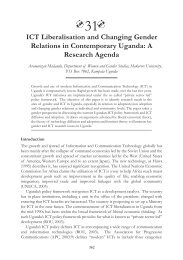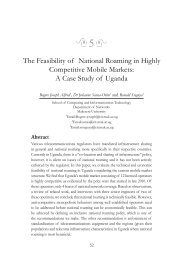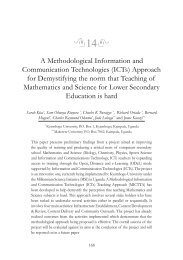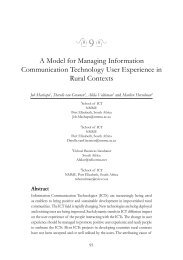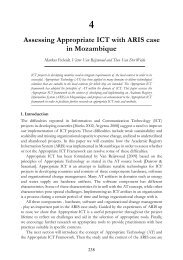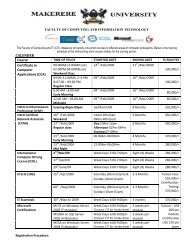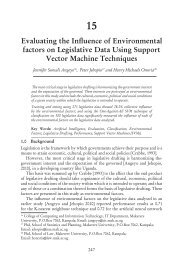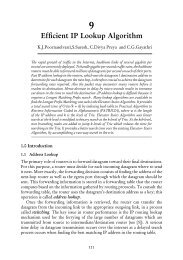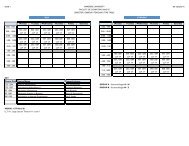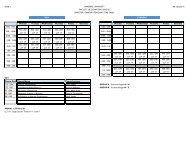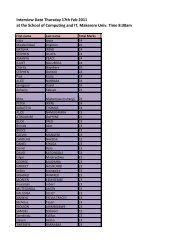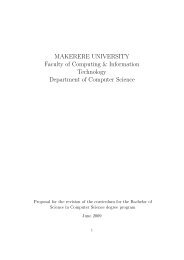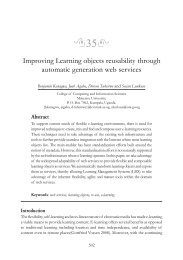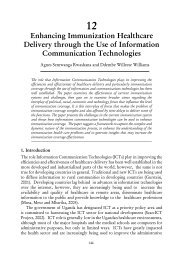John Matovu Aminah Zawedde Das Pamela and Herbert Ruhunde.pdf
John Matovu Aminah Zawedde Das Pamela and Herbert Ruhunde.pdf
John Matovu Aminah Zawedde Das Pamela and Herbert Ruhunde.pdf
Create successful ePaper yourself
Turn your PDF publications into a flip-book with our unique Google optimized e-Paper software.
54 Strengthening the Role of ICT in Development Volume VIII<br />
the traditions <strong>and</strong> heritage of ethnic <strong>and</strong> marginalized groups <strong>and</strong> help to keep<br />
their language, indigenous knowledge <strong>and</strong> way of life <strong>and</strong> livelihood alive <strong>and</strong><br />
active.<br />
The key factors responsible for the different ICT take-up rates in Africa are:<br />
per capita income, language, levels of education (illiteracy), internal digital divide<br />
within the African continent, restrictive regulatory framework, poverty <strong>and</strong><br />
the lack of infrastructure <strong>and</strong> the rural concentration <strong>and</strong> dispersed nature of a<br />
country’s population. In general, the lower a country’s per capita income, the<br />
less likely its population is to have access to both old <strong>and</strong> new information <strong>and</strong><br />
communication technologies [Baryamureeba, 2007].<br />
Key factors for using ICT in the media<br />
Today ICTs are seen as a basic tool for survival as they enhance effi ciency in the<br />
workplace. ICTs have the ability to increase the ease <strong>and</strong> speed of communication<br />
as well as overcoming the problem of transportation of messages over long<br />
distances. ICTs also help journalists reach out to colleagues in other parts of the<br />
world <strong>and</strong> keep them up to date with developments on the world scene.<br />
In Ug<strong>and</strong>a, a national ICT policy framework was set up in 2002 to ensure<br />
the optimum utilization of information to foster social economic development.<br />
The policy focuses on three areas: Information as a resource for development,<br />
mechanisms for accessing information <strong>and</strong> ICT as an industry. The policy<br />
recognizes that the three areas are not mutually exclusive.<br />
While several policies <strong>and</strong> legislations like “Ug<strong>and</strong>a Access to Information Act<br />
(2005)”, “Telecommunications Sector Policy (1996)” <strong>and</strong> “The Communications<br />
Bill (2007)” have been put in place, gaps exist when one looks at access to<br />
information broadly. For example, the Rural Communications Development<br />
Fund (RCDF) is not funding broadb<strong>and</strong> access <strong>and</strong> it has largely offered subsides<br />
for the establishment of services at district headquarters which are mostly urban<br />
or semi-urban ignoring the needs of the rural <strong>and</strong> underserved population who are<br />
its primary constituency, according to Mugira [2007].<br />
The Information <strong>and</strong> Communication Technology (ICT) ministry was formed<br />
in 2006; however, even with an entire ministry in place, there is lot more to be<br />
done in enabling access, use <strong>and</strong> application of ICTs to the majority of Ug<strong>and</strong>ans.<br />
According to a 2011 World Bank report, Internet users in Ug<strong>and</strong>a were reported<br />
at 4,178,085 in 2010; 3,165,582 in 2009; <strong>and</strong> 2,475,812 in 2008.<br />
Though progress is slow, there are sectors where ICTs have registered<br />
tremendous impact in the way things are being done <strong>and</strong> one of these is the<br />
journalism profession. To their credit, some Ug<strong>and</strong>an media houses have<br />
established a strong online presence. Radio stations, television stations <strong>and</strong> the<br />
print media have all registered a presence in cyberspace. These media houses have<br />
continued to be veritable sources of news <strong>and</strong> information to Ug<strong>and</strong>ans at home<br />
<strong>and</strong> abroad. It can be said therefore that the Ug<strong>and</strong>an media are measuring up<br />
with their counterparts in other parts of the world by their maintaining strategic<br />
presence on the information super highway.



